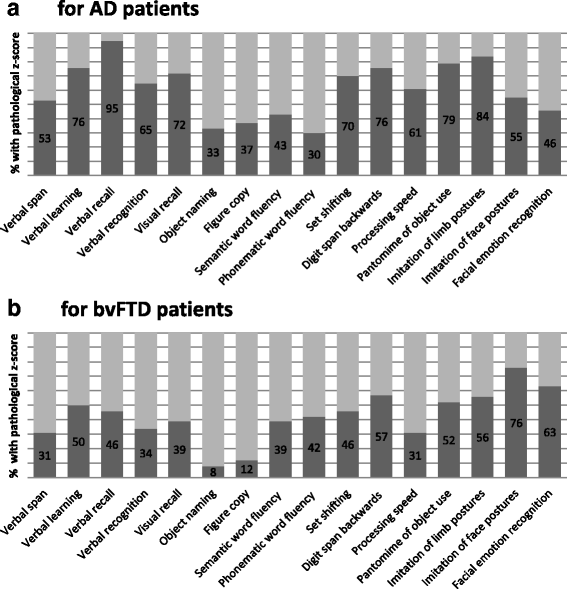Can cognitive assessment really discriminate early stages of Alzheimer's and behavioural variant frontotemporal dementia at initial clinical presentation?
- PMID: 28793933
- PMCID: PMC5550986
- DOI: 10.1186/s13195-017-0287-1
Can cognitive assessment really discriminate early stages of Alzheimer's and behavioural variant frontotemporal dementia at initial clinical presentation?
Abstract
Background: Neuropsychological testing is considered crucial for differential diagnosis of Alzheimer's disease (AD) and behavioural variant frontotemporal dementia (bvFTD). In-depth neuropsychological assessment revealed specific dysfunctions in the two dementia syndromes. However, a significant overlap of cognitive impairments exists in early disease stages. We questioned whether a standard neuropsychological assessment at initial clinical presentation can delineate patients with AD versus bvFTD.
Methods: In a retrospective approach, we evaluated and compared how cognitive profiles assessed at initial clinical presentation predicted the diagnosis of later verified AD (n = 43) and bvFTD (n = 26). Additionally, the neuropsychological standard domains memory, language, visuospatial skills, executive functions, praxis and social cognition were subjected to stepwise discriminant analysis to compare their differential contribution to diagnosis.
Results: Regardless of diagnosis, a percentage of patients presented with major deterioration in a wide range of cognitive domains when compared with age-matched normative data. Only few significant differences were detected on the group level: Patients with AD were relatively more impaired in the verbal recall, verbal recognition, figure copy, and surprisingly in the executive subdomains, set shifting and processing speed whereas bvFTD was characterised by more deficits in imitation of face postures. A combination of tests for verbal recall, imitation of limb and face postures, and figure copy showed the greatest discriminatory power.
Conclusions: Our results imply that the contribution of a standard neuropsychological assessment is limited for differential diagnosis of AD and bvFTD at initial presentation. In contrast to current clinical guidelines, executive functions are neither particularly nor exclusively impaired in patients with bvFTD when assessed within a standard clinical neuropsychological test battery. The significant overlap of bvFTD and AD concerning the profile of cognitive impairments questions current neuropsychological diagnostic criteria and calls for revision, regarding both the degree and the profile of cognitive deficits.
Keywords: Alzheimer’s dementia (AD); Behavioural variant frontotemporal dementia (bvFTD); Differential diagnosis; Neuropsychological tests.
Conflict of interest statement
Ethics approval and consent to participate
All participants gave written informed consent. The study was approved by the local ethics committee of the Ärztekammer Westfalen-Lippe and the Westfälischen Wilhelms-University (reference number 2012-365-f-S).
Consent for publication
Not applicable.
Competing interests
AJ and HL received honoraria from Novartis Pharma GmbH for lecturing and travel expenses for attending meetings. HW received speaker’s honoraria, consultation fees and grant support from Bayer-Schering, Biogen Idec, Merck-Serono, Novartis, Sanofi-Aventis, TEVA Pharma and Novo Nordisk. TD received honoraria and travel expenses from Sanofi Genzyme, Shire, Bristol-Myers Squibb, Boehringer-Ingelheim Pharma, Sanofi Aventis, Wisai, Novartis, Bayer Vital, Merz Pharma, Actelion and Lundbeck for serving as a speaker and consultant. TD received research support from Genzyme, Shire and Actelion. For conducting dementia studies, TD received grants from Novartis and Merz Pharma. SR declares having no competing interests.
Publisher’s Note
Springer Nature remains neutral with regard to jurisdictional claims in published maps and institutional affiliations.
Figures



References
-
- McKhann G, Knopman D, Chertkow H, Hyman BT, Jack CR, Jr, Kawas CH, et al. The diagnosis of dementia due to Alzheimer’s disease: recommendations from the National Institute on Aging-Alzheimer’s Association workgroups on diagnostic guidelines for Alzheimer’s disease. Alzheimers Dement. 2011;7:263–269. doi: 10.1016/j.jalz.2011.03.005. - DOI - PMC - PubMed
MeSH terms
LinkOut - more resources
Full Text Sources
Other Literature Sources
Medical

